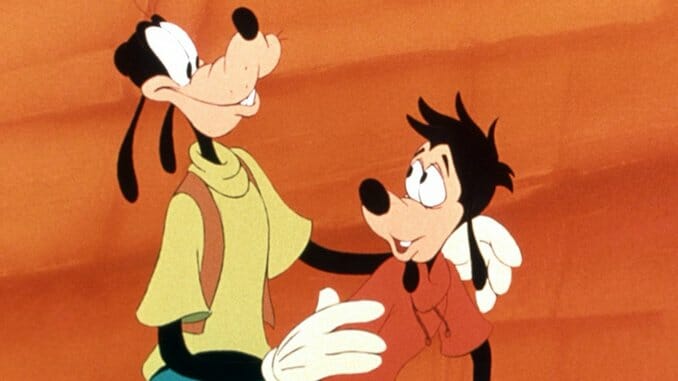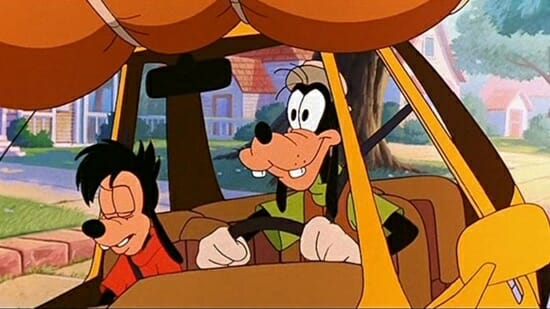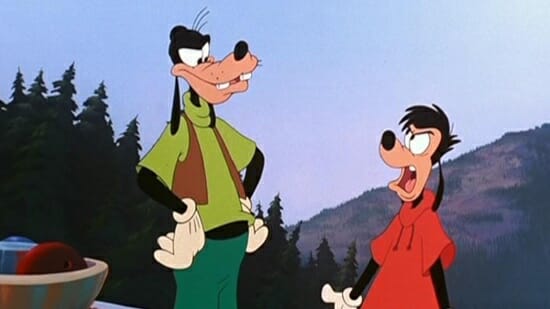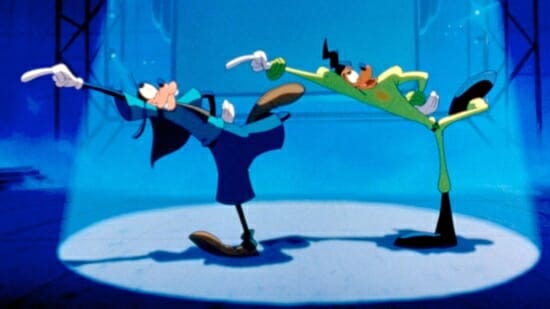A Goofy Movie Is 25, and I Am So, So Old
Watching one of Disney’s oddball classics as someone raising teens.

I woke up on the morning I wrote this article when the smoke alarm went off because my fiancée’s tween daughter turned the electric range on too high, and one of the first things I had to do (after teaching her how to make pancakes) was get her 15-year-old brother to answer a Facebook message. He doesn’t check Facebook as a general rule (the lucky bastard). This is a regular day now—a lot of sudden reminders that kids are growing apart from you even as they do still need guidance for what seem to you to be the simplest things.
It’s fitting, then, that A Goofy Movie was met with little enthusiasm when I put it on. I saw the film in theaters when it came out in 1995 and thought it was strange and not really in keeping with the other more fantastical, epic stories that Disney was releasing in theaters during their ’90s Renaissance. I recall saying it “wasn’t about much” afterward, but also thinking there was something about it I wasn’t getting.
I have nonetheless sought A Goofy Movie out for a re-watch almost more often than any of the other Disney animated films over the years—partly because it is, compared to the other, polished parts of the Disney canon, just weirder. It has a distorted, sometimes jaded sensibility, more at home with the anarchic feel of cable TV cartoons than the fresh-faced princess narratives of the movies immediately surrounding it. It is also one of the vanishingly few animated Disney films that tackles interpersonal relationships with any kind of real-world point of reference. Goofy and his son Max are not returning the heart of the Earth Mother to her, lifting a sorceress’s sleeping curse or winning Grecian godhood, but they are nonetheless on an epic hero’s journey.

Muse, tell me how he wandered and was lost
when he had wrecked the holy town of Troy,
and where he went, and who he met, the pain
he suffered in the storms at sea, and how
he worked to save his life and bring his men
back home. —The Odyssey, Wilson translation
You know (because I told you) that this is one of a particular class of road trip movies that can be mapped onto Joseph Campbell’s monomyth/hero’s journey. (The fact The Little Mermaid gets not one but two sight gags in the movie might be reading too much into it, but there’s something nautical about the whole affair, right up to the point father and son reconcile their differences while drifting through a river canyon.) A Goofy Movie opens with its storm-tossed hero, Max, seeking out his own muse, fellow high schooler Roxanne. His idyllic dream is disrupted when his subconscious bombards him with body issues, warping him into the gangly, awkward version of his father, who is Goofy. For the opening of a kid’s movie, it’s a lot.
Max wins himself glory and recognition on the last day of school by upstaging the principal’s closing remarks with a pop concert that catches Roxanne’s eye, but gets him busted. How on Earth he thought he’d get away with it is a question never answered, but his principal’s hysterical phone call to his father convinced Goofy that his son is hell-bound unless he figures out how to get through to the kid. Max is dragged along on a father-son fishing trip just as he’s managed to land a hot date with Roxanne, and he lies to her about why he’s forced to leave, claiming he’ll be on stage for a concert in L.A.

-

-

-

-

-

-

-

-

-

-

-

-

-

-

-

-

-

-

-

-

-

-

-

-

-

-

-

-

-

-

-

-

-

-

-

-

-

-

-

-









































